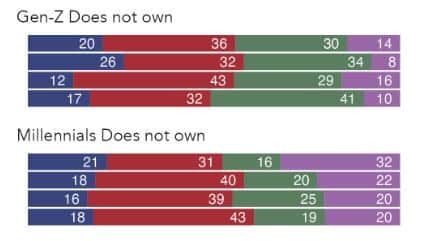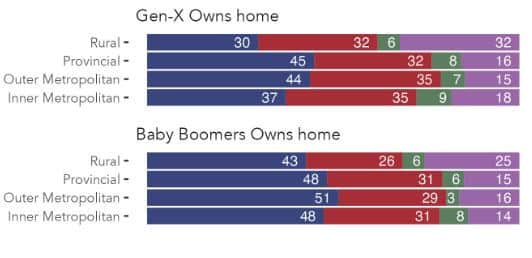One of the key take-aways from Albanese’s election and ALP wins in Victoria and NSW was the generation gap in ALP-LNP support. We know that in Australia and elsewhere, the millennial generation is not getting more conservative with time, and this is probably due to their relatively lower net wealth compared to previous generations at the same age.
Some recent publications by Accent Research political data analysts have further fleshed out this picture. Accent analysed current voting patterns according to home ownership status and included variables of generation and location of residence.
The result shows markedly lower conservative voting among those who do not own their own homes. The issue for the LNP is most obvious among millennials, of whom just 16-21% of those who do not own a home are voting for them. This is the generation currently around 27 to 42 years old.

Property ownership reflects economic enfranchisement. Millennial non-home owners, along with Gen Z voters who don’t own a home, are the most likely to support the Greens. Among older generations (Gen X and Baby Boomers), those who don’t own property are the most likely to support independent candidates or the far-right parties.
On the other hand, property owners among these two older generations back the LNP to an election-winning degree.

Taken together, it appears that continued housing inequality will make the LNP electorally unviable. You can’t be a conservative if you have nothing to conserve.
Ironically, the LNP’s backing of this core constituency, and thus its unwillingness to promote housing reform, has been slowly eroding its capacity to win elections. Likewise, over the long-term, if successful, Labor’s plans to increase housing supply will end up creating more conservative voters.
Feature image via Unsplash courtesy of @tierramallorca.
Sign Up To Our Free Newsletter